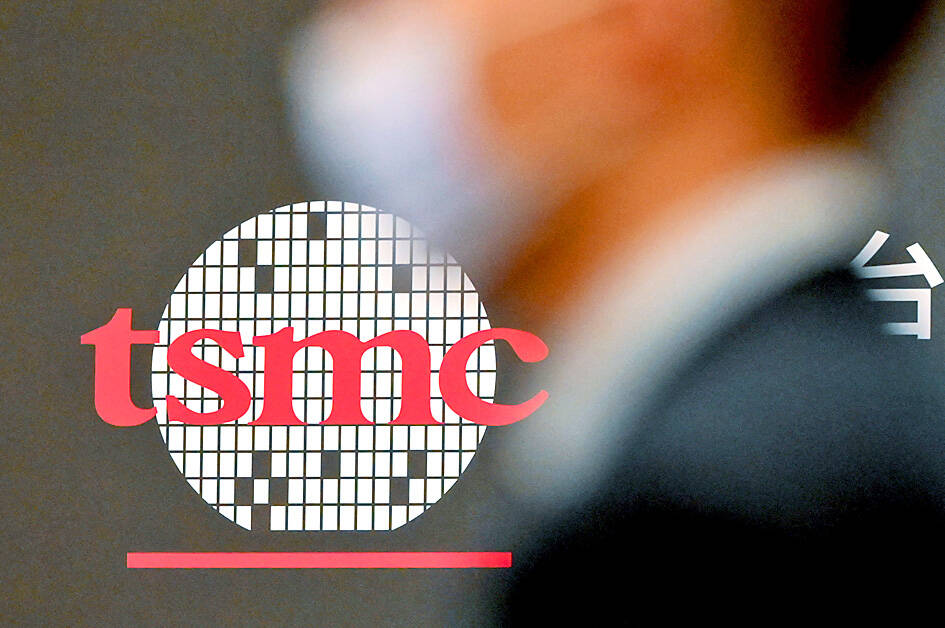Taiwan Semiconductor Manufacturing Co (TSMC, 台積電) regained its US$500 billion market capitalization after investors ramped up bets on tech leaders best placed to ride an anticipated artificial intelligence (AI) boom.
Asia’s most valuable company gained 3.31 percent yesterday in Taipei trading, fueled also by hopes that a post-COVID-19 chip downturn is nearing an end. That took its gain to 32.22 percent so far this year, cementing its position among the world’s 10 most valuable corporations after overtaking Visa Inc last month.
TSMC’s gains contributed about 160 points alone to the TAIEX yesterday, which closed up 261.23 points, or 1.54 percent, at 17,216.60, the highest since April 14 last year, when the benchmark index closed at 17,245.65.

Photo: Sam Yeh, AFP
“Investors remained upbeat about AI development, and TSMC is one of the biggest beneficiaries,” Mega International Investment Services Corp (兆豐國際投顧) analyst Alex Huang (黃國偉) said.
Morgan Stanley this week raised TSMC’s price target, citing higher demand for energy-efficient and low-cost AI custom chip designs.
“With the killer apps of generative AI [such as ChatGPT], we are seeing the semi industry’s growth stage shifting from the mobile computing to the AI computing era,” Morgan Stanley analysts wrote over the weekend. “We view TSMC as a key enabler of future AI semis given its technology leadership.”
Meanwhile, Cathie Wood’s funds have re-entered TSMC and Meta Platforms Inc after nearly a year and a half, as the high-profile manager makes new bets on AI and chips.
Two Ark Investment Management LLC funds, including Wood’s flagship Ark Innovation ETF, bought 174,848 shares of Facebook’s parent company on Monday, while Ark Autonomous Technology and Robotics ETF picked up 98,170 shares of TSMC, data compiled by Bloomberg showed.
Before this, Ark last held the two stocks in the final quarter of 2021.
Ark’s moves came weeks after Wood spoke highly of Meta’s AI strategy and said her decision to drop Nvidia Corp was due to the company facing growing competition.
She added during an interview with Bloomberg last month that she would pivot “to another set of plays.”
Wood’s other AI-related bets include electric vehicle maker Tesla Inc among large caps and UiPath Inc, Twilio Inc and Teladoc Health Inc among smaller names.
The broader rally persists despite warnings that the market might be getting ahead of itself, given the uncertainty over how to monetize AI services.
TSMC, while touting its own potential role in the rollout of AI, has expressed caution over the outlook for the smartphone market that still comprises a significant chunk of its revenue, although company executives have called for a gradual recovery in the second half and a resumption of growth next year.
Last week, TSMC chairman Mark Liu (劉德音) said the chipmaker’s capital expenditure for this year might wind up close to the bottom end of a previously forecast range of US$32 billion to US$36 billion. That is a signal that TSMC, like its rivals across the electronics industry, remain cautious in the face of plunging consumer spending and an uneven post-COVID-19 economic recovery in China.
Additional reporting by CNA

MULTIFACETED: A task force has analyzed possible scenarios and created responses to assist domestic industries in dealing with US tariffs, the economics minister said The Executive Yuan is tomorrow to announce countermeasures to US President Donald Trump’s planned reciprocal tariffs, although the details of the plan would not be made public until Monday next week, Minister of Economic Affairs J.W. Kuo (郭智輝) said yesterday. The Cabinet established an economic and trade task force in November last year to deal with US trade and tariff related issues, Kuo told reporters outside the legislature in Taipei. The task force has been analyzing and evaluating all kinds of scenarios to identify suitable responses and determine how best to assist domestic industries in managing the effects of Trump’s tariffs, he

TIGHT-LIPPED: UMC said it had no merger plans at the moment, after Nikkei Asia reported that the firm and GlobalFoundries were considering restarting merger talks United Microelectronics Corp (UMC, 聯電), the world’s No. 4 contract chipmaker, yesterday launched a new US$5 billion 12-inch chip factory in Singapore as part of its latest effort to diversify its manufacturing footprint amid growing geopolitical risks. The new factory, adjacent to UMC’s existing Singapore fab in the Pasir Res Wafer Fab Park, is scheduled to enter volume production next year, utilizing mature 22-nanometer and 28-nanometer process technologies, UMC said in a statement. The company plans to invest US$5 billion during the first phase of the new fab, which would have an installed capacity of 30,000 12-inch wafers per month, it said. The

Taiwan’s official purchasing managers’ index (PMI) last month rose 0.2 percentage points to 54.2, in a second consecutive month of expansion, thanks to front-loading demand intended to avoid potential US tariff hikes, the Chung-Hua Institution for Economic Research (CIER, 中華經濟研究院) said yesterday. While short-term demand appeared robust, uncertainties rose due to US President Donald Trump’s unpredictable trade policy, CIER president Lien Hsien-ming (連賢明) told a news conference in Taipei. Taiwan’s economy this year would be characterized by high-level fluctuations and the volatility would be wilder than most expect, Lien said Demand for electronics, particularly semiconductors, continues to benefit from US technology giants’ effort

‘SWASTICAR’: Tesla CEO Elon Musk’s close association with Donald Trump has prompted opponents to brand him a ‘Nazi’ and resulted in a dramatic drop in sales Demonstrators descended on Tesla Inc dealerships across the US, and in Europe and Canada on Saturday to protest company chief Elon Musk, who has amassed extraordinary power as a top adviser to US President Donald Trump. Waving signs with messages such as “Musk is stealing our money” and “Reclaim our country,” the protests largely took place peacefully following fiery episodes of vandalism on Tesla vehicles, dealerships and other facilities in recent weeks that US officials have denounced as terrorism. Hundreds rallied on Saturday outside the Tesla dealership in Manhattan. Some blasted Musk, the world’s richest man, while others demanded the shuttering of his